Think Shoreditch and inevitably thoughts are of clubs, parties and street art. A more considered assessment of the past 20 years would oblige image wizards to render Shoreditch in the collective memory as a place of creativity, craftsmanship, experimentation, fashion, film making, music making and art performance to name just a few. Sadly this week Shoreditch says goodbye to a key pillar in the building of its vibrant creative community, the building formerly known as the Foundry, currently known as the Red Gallery is closing and this blog is a tribute to those memories.
Twenty years ago the ground floor and two basement levels were occupied by the arts centre and bar called The Foundry.
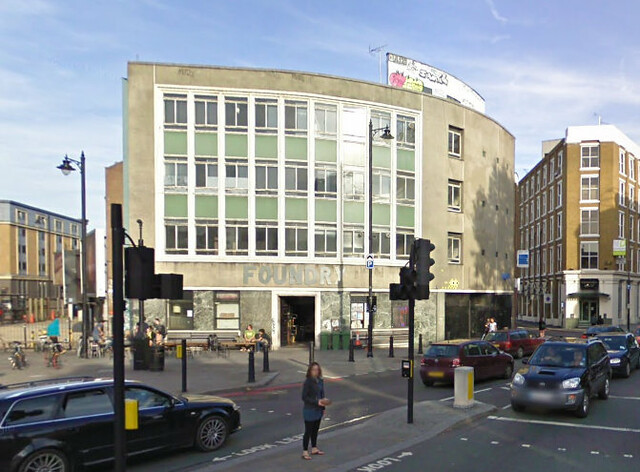
FOUNDRY (Google Street View Sep 2009)
The Foundry was launched around 1998 by Jonathan Moberly, Bill Drummond and two other partners and got its name from the fact that there was actually a foundry there in the 90s used in jewellery manufacture. Within a year Jonathan was joined by Tracey Moberly who was planning a comparable venue in Manchester but got sucked into the creative whirlwind gathering strength in Shoreditch. The building was constructed as a branch of Barclays Bank which lead to its quirkiest architectural feature, a vehicle turntable in the middle basement. Vans carrying sacks of cash came down a very steep ramp, loaded and unloaded and then spun on the turntable to face back up the ramp. At many events in that basement the sounds weren’t the only things on turntables.
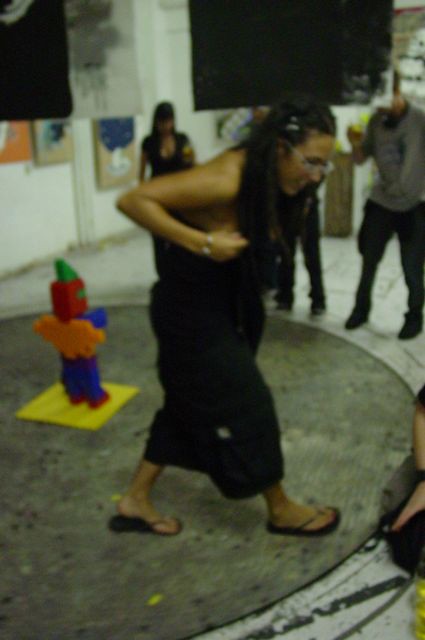
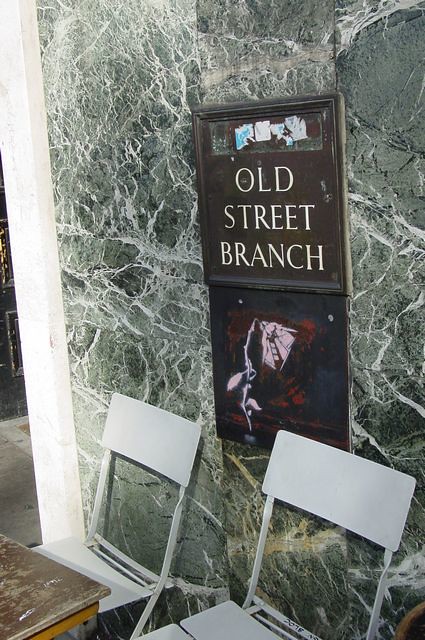
Copyright up on bank letter box
As well as being a rather grungy though welcoming space for a coffee, a beer and a chat The Foundry hosted many experimental arts events. Whether it was music, performance or paintings or installations, The Foundry housed a curation free, zero pressure arts venue. With 6 spaces available, artists could be offered walls or rooms for them to come in, install their work, invite their friends, have their event, they just had to do all their own hanging, promotion and sales, The Foundry lent literally just its location. Nothing with arts council funding was accepted, everything had to be self funded by the artists. There were no charges for artists to use the space for public display, there were no commissions on any sales, all that was asked of visual artists was that they contributed a piece of art, and it had of course to be something of a standard comparable to the art on display, no simply dashing off a sketch on the back of a sheet of A4. Unless of course that was the mainstay of your art output!
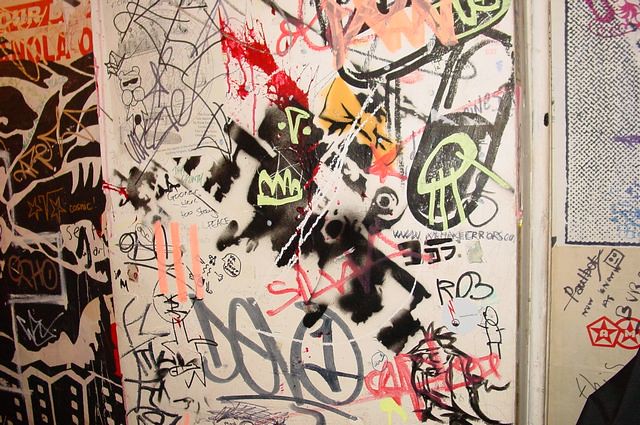
Banksy Happy Chopper
Many artists who got a break in The Foundry went on to become lauded names, including from the street art world Banksy, Faile, Stik and Carrie Reichart. Musicians who cut their teeth with live performances included The Liberteens and Kate Nash, Kate Nash herself has said that she was always going in and performing with Adele at the Foundry.
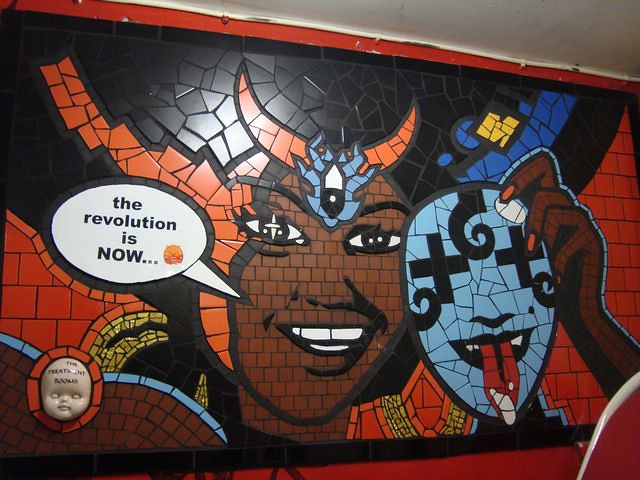
Hanging about in the Ladies with Carrie Reichardt
Tracey Moberly told Graffoto of the mixing that took place at The Foundry “you’d have a group of ex university lads doing a performance thing upstairs (the ground floor bar) then you’d have a group of punks downstairs doing their performance stuff with all these other exhibitions going on – it was a melting pot of people and ideas. New art going into uncharted territory would come from it”.
The mixture of sub-species who populated, haunted, used and abused The Foundry extended to a considerable collection of super fit crusties plying their trade as cycle couriers, they would rest up with their bikes outside the Foundry and consume vast quantities of coffee from The Foundry’s Gaggia coffee machine. The London Courier Emergency Fund, a charity that raises cash for injured bike couriers used the Foundry as its base.
Tracey hosted a midweek arts radio panel show “The Late Late Breakfast Show” broadcast live from The Foundry, the setting would be a group of people clustered around a table underneath a truly Heath Robinson-esque acoustic reflector/microphone device. I twice had the pleasure of being invited onto the show. This involved sneaking out of my shirt-sleeved suit wearing day job, dressing down and going AWOL for a few hours.
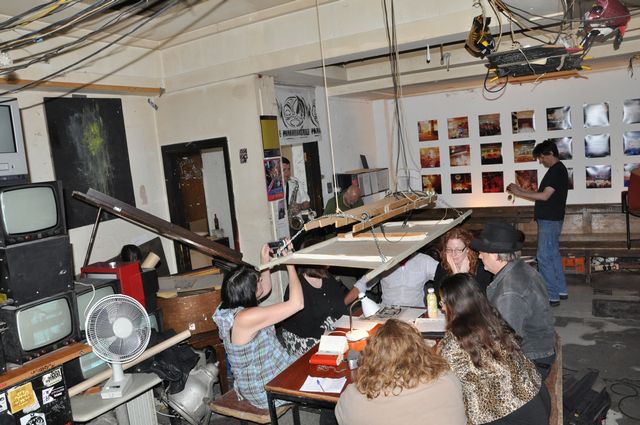
The first occasion was a street art heavy panel including The Krah, Inkfetish and Neonita who I had the pleasure of meeting then for the first time.
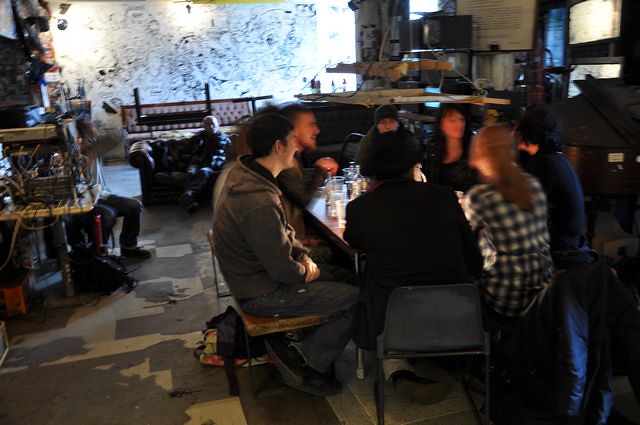
ON AIR!
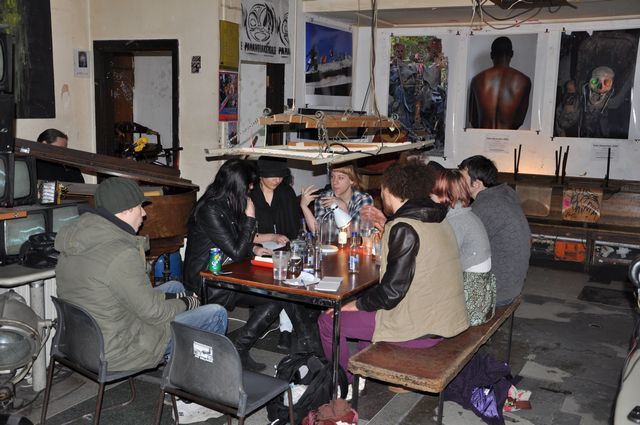
The Late Late Breakfast Show, Resonance FM, Feb 2010
The second occasion was poetry rich and included The Worm Lady and this amazing poetry performance by Grassy Noel (geddit?) backed by freeform jazz saxophonist Mike Walter and Lol Coxall.
Greek street artist The Krah curated two exhibitions in The Foundry’s middle basement and it’s a major plus point that group shows could be artist led; The Krah remains a curator of superb group shows and indeed a very active artist and graffiti writer.
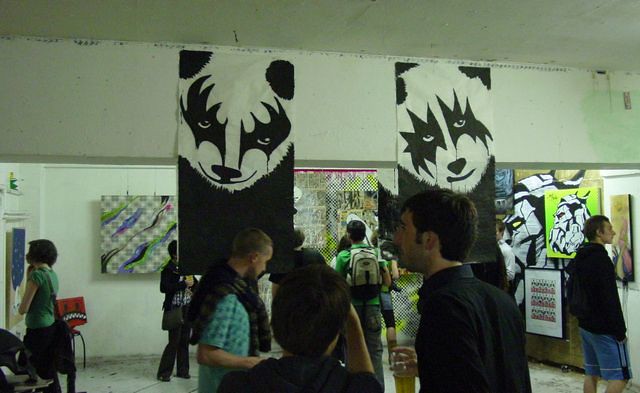
The Krah Group Show feat Pure Evil, Blam, Snub 23, Shannon Crees, 45 RPM, Rugman & others, Aug 2008
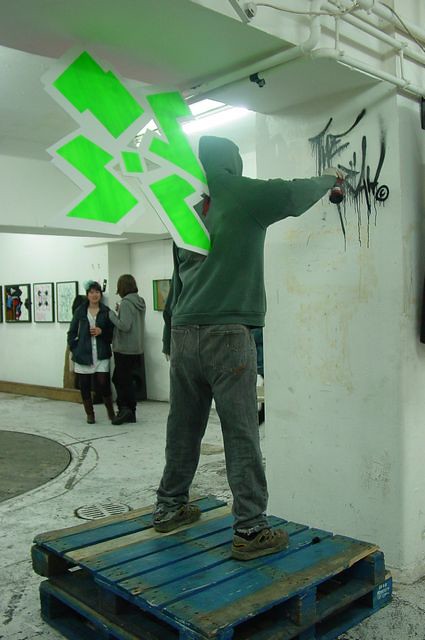
The Krah, Foundry, April 2009
Banksy was no stranger to The Foundry, leaving his mark on the famous corridor inside as well as, quite notoriously, on the car park wall outside. Banksy’s Happy Chopper and Grim Reaper stencils inside the lower ground corridor were left to fend for themselves which is the way things should be, if you look closely as well as the more obvious Faile dog and the perhaps less obvious Peripheral Media Projects sticker you can make out the Faile dog “dogged” by a very early Stik figure.
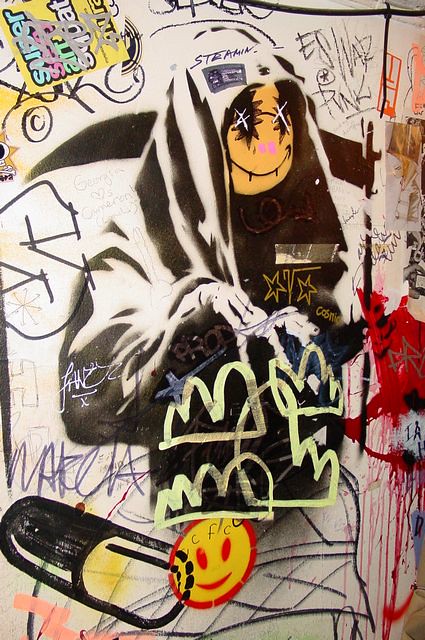
Banksy Grim Reaper
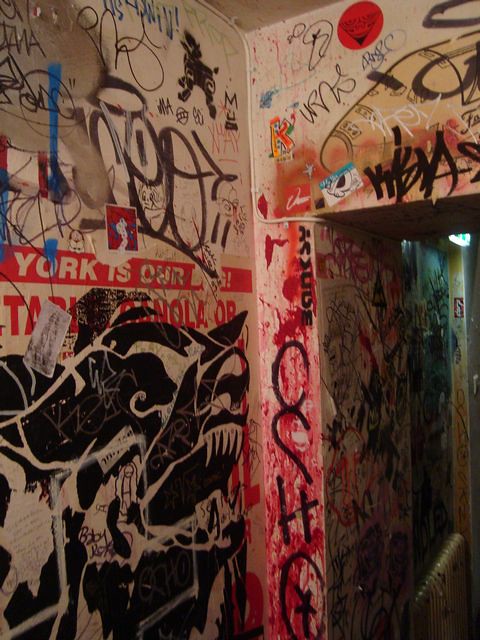
Faile dog & plane, Banksy stencil tag,
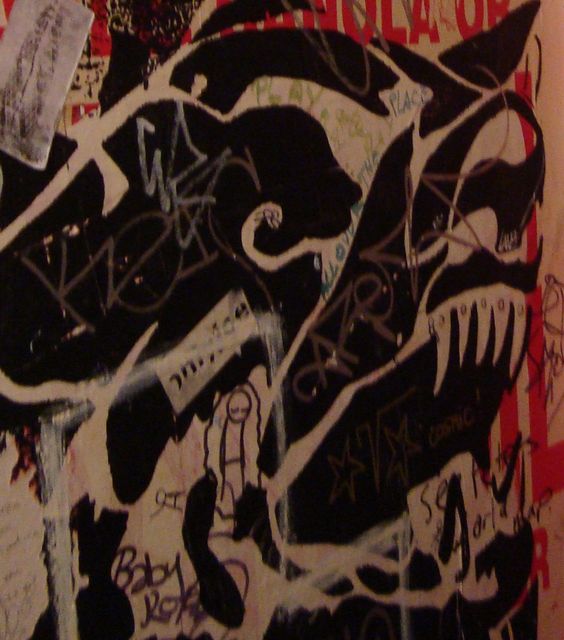
Faile feat Stik
Stik kindly sat down with Graffoto and came over all misty eyed with his personal Foundry recollections. “I knew the building very intimately, I know the ghosts of that building, it was very creepy going down there on my own but I felt kind of privileged."
Stik’s second art show was in The Foundry and came about in a rather unusual way as Stik had a novel relationship with The Foundry, he was the cleaner!
“Anyone could do an exhibition there but I was kind of afraid to ask but then Jonathan (Moberly) offered me one” and so in 2008 Stik the building cleaner became Stik the exhibiting artist in the Library, the small room at the front of the bar upstairs. Stik also managed to hijack the stairwell with some large wheatpaste figures. The stairwell was not a space you could ignore in The Foundry, it was where so many people crossed paths on their way to or from or queuing for the toilet. This was a fairly unstable period in Stik’s life “At this point I was sofa surfing, I have photographs of me doing these paintings for The Foundry in my friend’s spare room where I was dossing.“
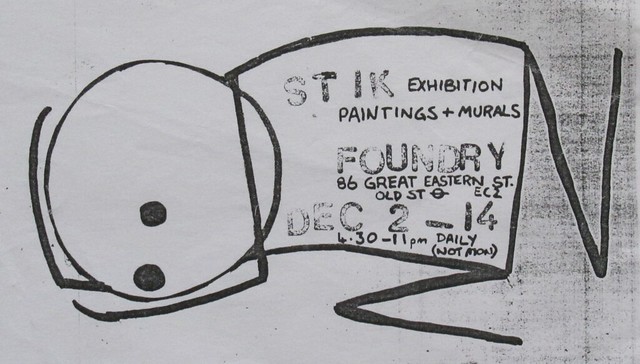
Stik Exhibition Flyer, Photo by Stik
The Foundry’s “anything goes” spirit is fondly recalled by Stik “They had a policy where you could do whatever you wanted, there was no curation, no invigilation, there was nobody looking after it, you do what you want; they don’t take any money they don’t deal with any shit and they don’t do advertising, nothing, they literally just give you the space. A lot of established galleries do the same but they claim to do a lot more; The Foundry was just really straight about it."
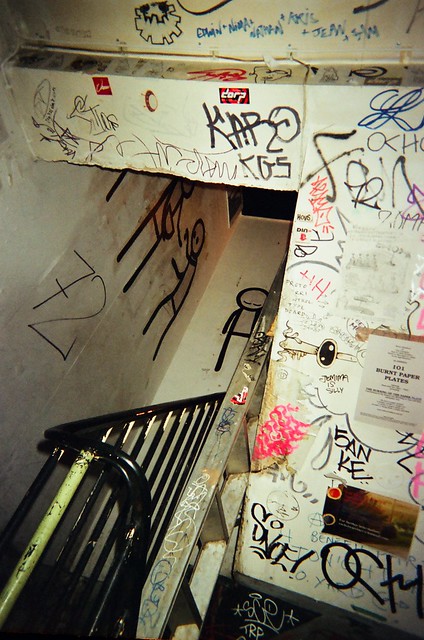
Stik, photo by Stik
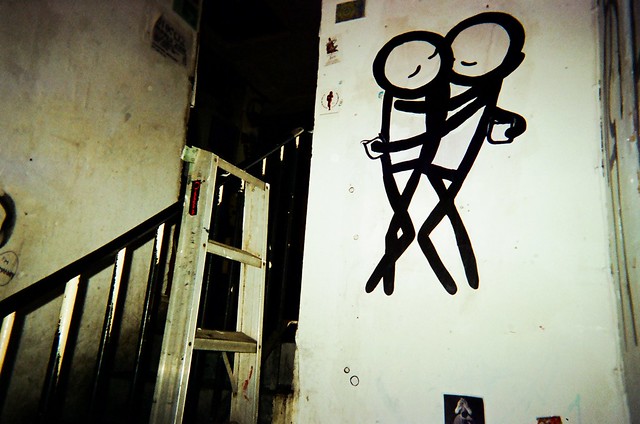
Stik Lovers, photo by Stik
Stik spent a period living in a Momart art container and he listened to Resonance 104FM: “It was the first station that had people I knew on it, it was really cool. Resonance was so underground, it was so weird” The thing that blew his mind was the realisation it was broadcasting from the place he knew so well.
“The Foundry was like a safe haven, it was a base of operations , you could try out things there, you could take your felt pens or your paint or stencils and try it all out there in the corridor.” – Stik
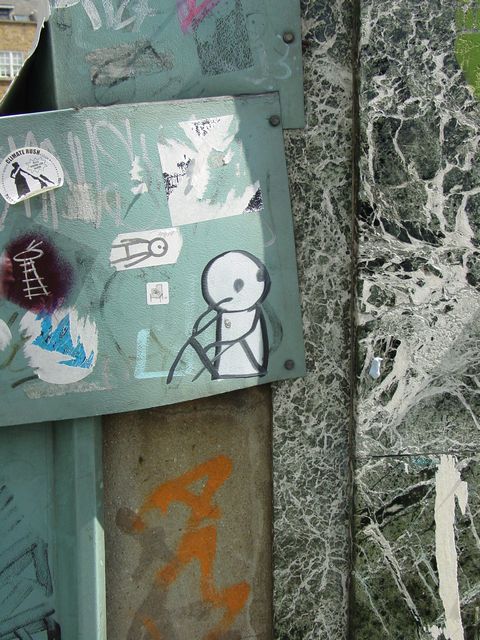
Stik, Foundry exterior, 2009
In 2010 serious damage was inflicted on the creative community in Shoreditch when the property owners won permission to raze the whole building and replace it with an 18 storey 350 room hotel. Tracey and Jonathan fought tooth and nail through the council and the courts to get a requirement for community arts facilities to be incorporated as a planning consent requirement. At the time of the application Hackney Council had a Development Management Policy which declared that the Council would “protect arts, culture and entertainment facilities by resisting their loss, unless a replacement facility is reprovided [sic], or it is demonstrated that the facility is no longer required in its current use”. The Council turned one blinkered eye away The Foundry’s long history of providing a nurturing home for the arts community and diverted their other myopic eye away from their own policy and by failing to make suitable provision in the consent sounded the beginning of the end of grass roots arts community within this area.
While running the Foundry, the Moberlys faced a never ending assault from the council’s buff squad (cleaning team) constantly cleaning perfectly legal permissioned art from the front of The Foundry.
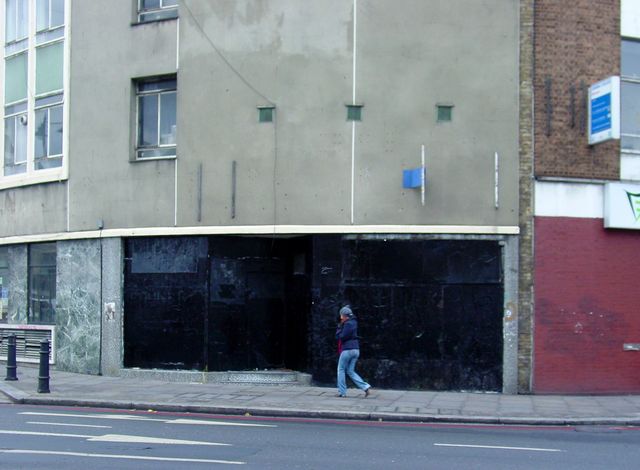
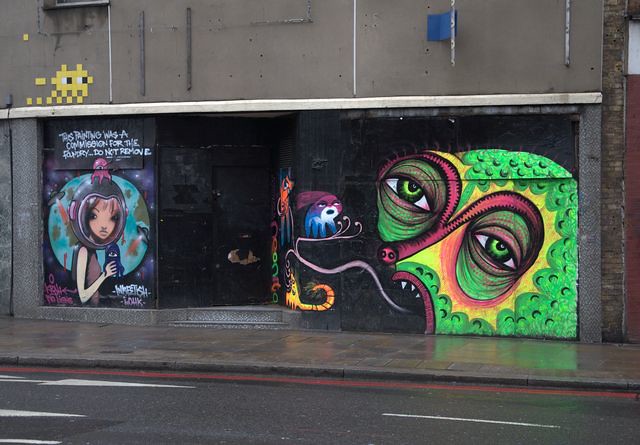
Inkfetish, Neonita 2010
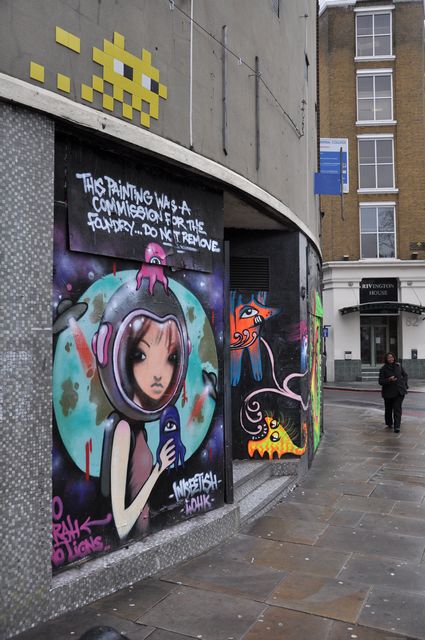
"Fuck The Buff" to paraphrase Inkfetish, also feat Neonita detail, 2010
The irony of that became apparent in 2010 when Hackney Council’s planning permission for the demolition of the Foundry building to make way for an hotel incorporated a particularly bizarre condition, a couple of Banksy street art pieces around the back overlooking the car park were to be preserved. Graffoto covered this at length in 2010, describing the relevant Banksy artworks as “pieces of shit” yet the council, who had habitually destroyed brilliant art and graffiti that appeared around the front of the Foundry were now mandating their preservation. Truly the blind are dictating the management of the public visual landscape.
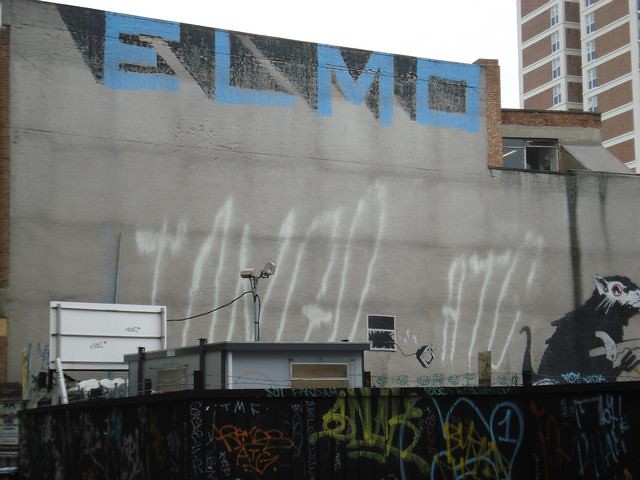
Classic Elmo Rooftop roller, Tango ATG, and some crap by Banksy
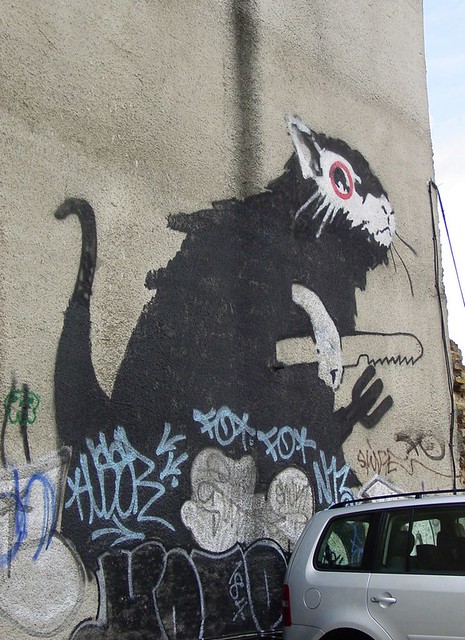
Still shit
Having kind of pulled the tail of the developers a little too hard the Moberly’s were obliged to close The Foundry’s doors for the last time in 2010. This prompted community protests and in an eerie foretaste of what was to come a year later, a squat of the building under the banner “Occupy”.
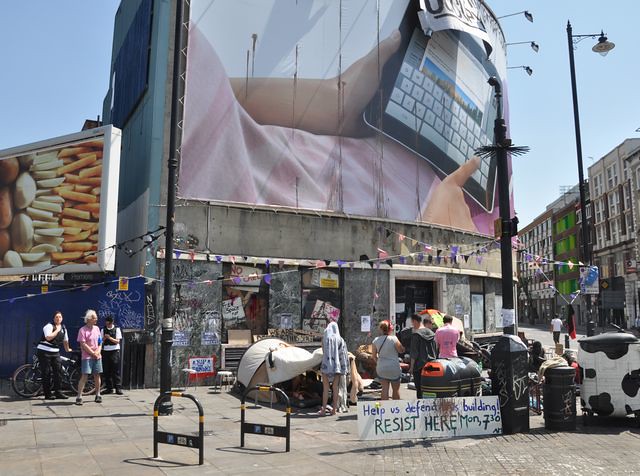
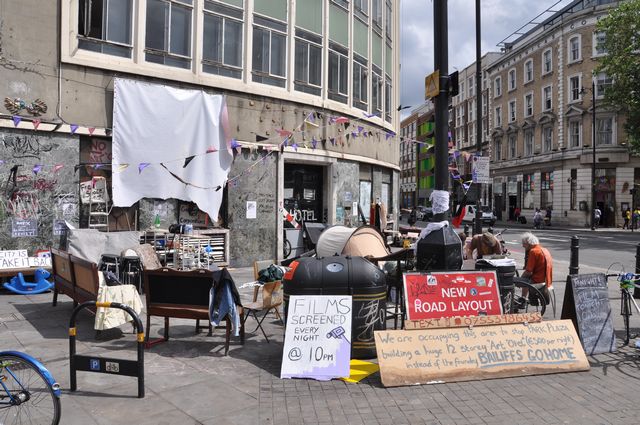
Stik has an interesting confession about the time when the Foundry building was being squatted. “The first generation of squatters were in there and I had just had an exhibition in Mile End Art Pavillion in 2009 and I had made 16 wooden figures in various positions, these 6 foot cut out plywood figures sat in my room in St Mungo’s Hostel. I needed some space so I started to put them up on the street. A lot of them got dismantled or smashed but a few remained, one went up on The Foundry, one went up on the Brady Art Centre, one went on the back wall of Austin Gallery at the top of Brick Lane; a couple have reappeared recently but I know most of them were destroyed."
"I took one of these up to the roof of The Foundry, I needed to attach it to this blue wooden board on the side of the building so I tacked in nails at strategic points on its hands, its feet, on the top of its head and its body and dangled it down over the edge of the building so it sat flush with the blue background, I tied off the cable. I went to the other side of the building and I leaned round and I got a 3 meter extension pole with a hammer gaffa taped to the end of it and I banged the nails in, I had about a 1 in 10 strike rate. Meanwhile, the squatters were trying to keep quiet cos you have to be when you are squatting and there was me banging on the wall to get this artwork in. They were rightly pissed off with me but I had started so I had to finish and it took me about an hour to get all seven nails into the wood. It stayed up there for years. About 4 years ago one of the hands snapped, it looked like someone had tried to rip it off the wall, I went back up there on a ladder with a hammer and I nailed it back in which is why one of the hands is a bit wonky. “
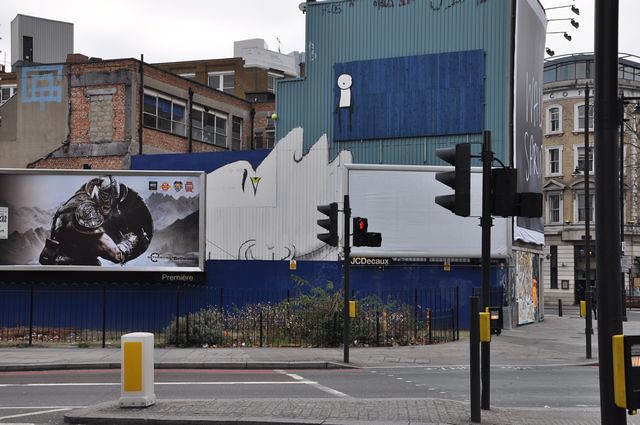
Stik, also feat RUN & ATG, 2012
In fact the figure stayed up there until this month (August 2018), I bumped into Stik with Ernesto a couple of weeks ago supervising the removal of the piece. It will be auctioned and the proceeds donated to charity.
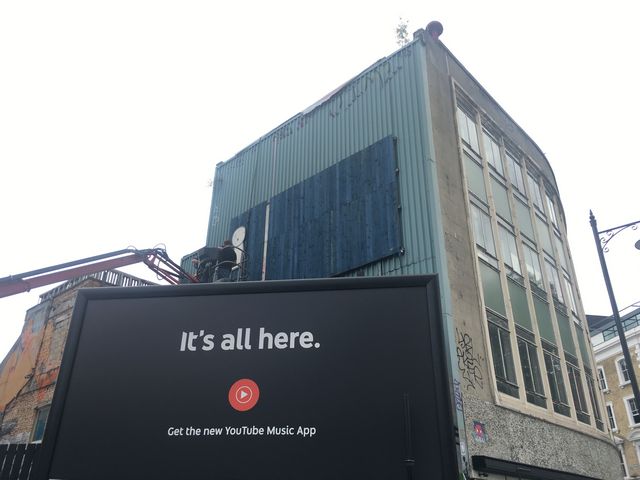
Goodbye Stik Figure
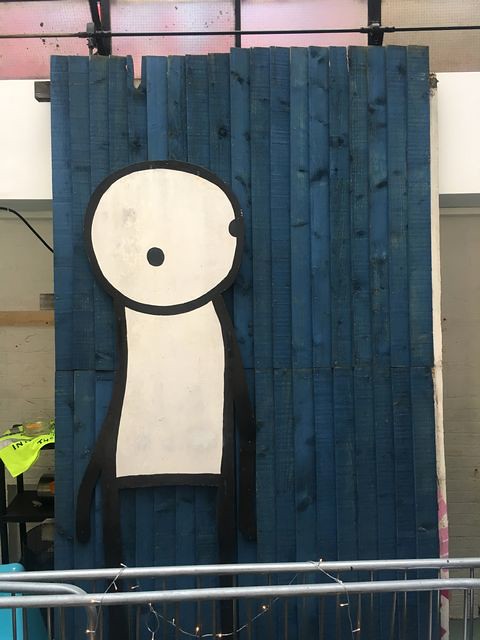
Stored and displayed, Red Gallery garage sale (in Foundry space!) Aug 2018
The Foundry’s DNA proved to be very resilient and in 2012 Red Café and Red Gallery opened with Ernesto Leal and Yarda Krampol at the helm, continuing the culture mission in a similar vein on more or less the same site. “I was doing these pop ups and the landlord came along to me said “This building is going to be empty for 3 months do you want to take it?” Ernesto recalls, “so I said yeah, fine”. The space Ernesto moved into actually is not the same space as The Foundry, the Foundry occupied the front ground floor facing towards Old Street Roundabout and occasionally extended its activities into the Car Park at the rear, including the 2003 and 2004 “Shoreditch Festival” which saw all the streets in the Shoreditch Triangle being closed to traffic for a day and also Banksy creating the huge rat and the TV thrower in the car park. Red Gallery took over a couple of ground floor spaces and then the upstairs floor in the part of the building next to the car park, seemingly there had been some kind of private college on the upstairs floors. Red then took over the Car park and also the basement below the gallery and café, though these were not the bank vaults that The Foundry had used.
Red Gallery encouraged the street art around the building and in collaboration with other agencies was able to bring many top street artists work to the Red spaces including in the early days EINE who did specific RED shutters, Roa, Phlegm and Jo Peel.
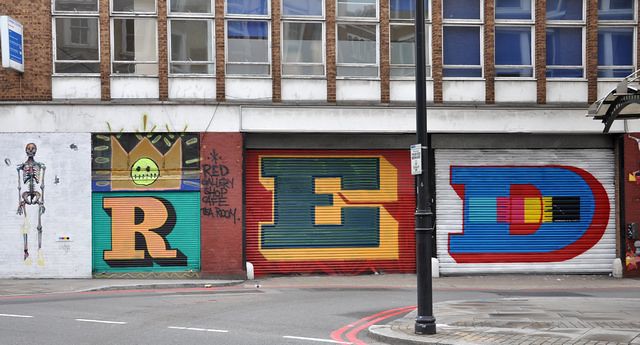
RED by Eine, also feat Part2ism
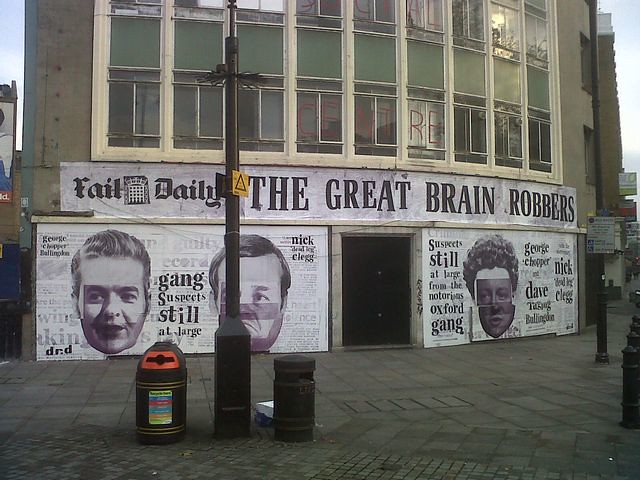
Dr d. 2010
Music was a core feature at Red with many music festivals and experimental sound events taking place in the basement. Ernesto’s old warehouse party organising skills combined with a desire to see interesting fusions within the music scene and experimentation with music combining with poetry and other art forms. “Our motto for this experimentation was “The Only Certainty is The Experience” said Ernesto, a motto conveniently burning in throbbing neon over the downstairs bar.
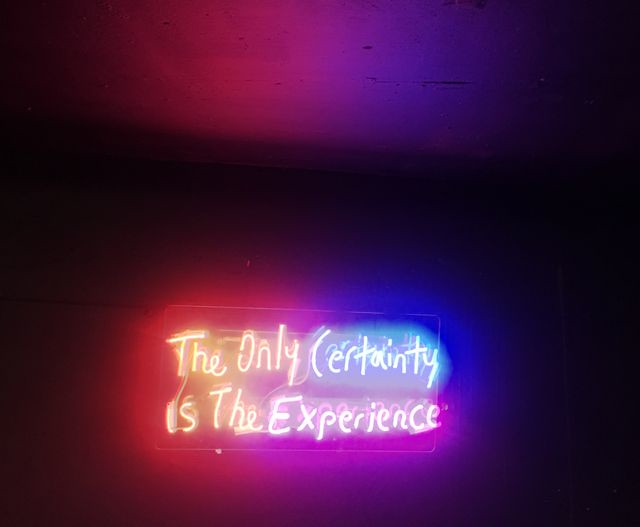
In 2012 the graffiti world was offering support to the family of graffiti writer King Robbo as he battled to cling on to life, Team Robbo, a graffiti movement inspired by its leader and founder Robbo held an exhibition called “The Origin Of The Species” in the Red Gallery, its novel feature being synchronisation with an exhibition in New York featuring influential old school New York graffiti writers. The exhibition was in part a fundraiser group show took place in the gallery as a fund raiser to support Robbo and his family.
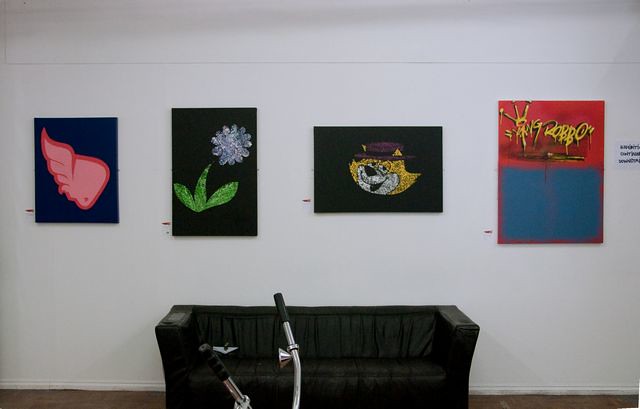
Art by Robbo
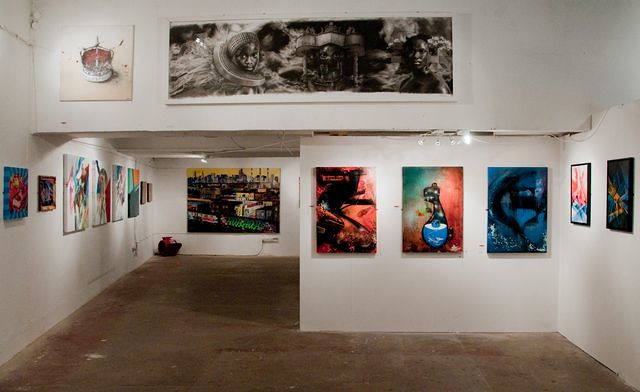
Origin Of The Species, Sep 2012
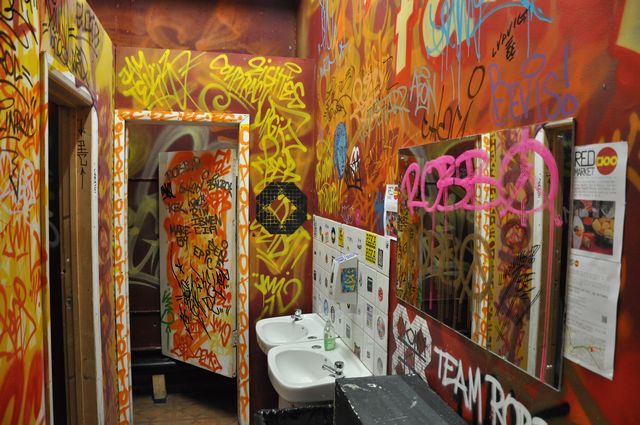
Team Robbo, Red Gallery loos
As the period Red was in the space extended and the owner allowed use more of the spaces, Red started “giving away” spaces to artists and offering work spaces in what became a shared space model now widely recognised under brands such as WeWork. At all times the explicit understanding was that there could be no guarantee of occupancy, the owner could empty the building with next to no notice and that risk had to be acceptable to any parties coming in.
SoundCloud was born in the Red Quarters spaces on the upper floors. Florian Stronk, Co-Founder and CEO of BravoCo told Graffoto that the cheap space with minimal commitment was what allowed them to screw up their first attempt to start a tech business, pick themselves up and succeed with their second and current venture. “It is the saddest day in our Company’s existence the day we have to leave Red” said Florian.
As Ernesto and I chatted, students from RADA were setting up for a one off performance art piece that evening, RED providing the kind of opportunity to stage and perform free from the usual commercial requirements which is of course in the traditions of the location back to The Foundry days. “We never had any misconceptions about what our position was” Ernesto confirms, “we saw it as an opportunity to change perceptions of what art spaces should be about. We opened up the doors to the local community and I think it has worked” by which he refers to club spaces which are dark in the daytime their open door allowed people to come in and see “oh, these spaces are quite nice”
Ernesto has concerns however that there are fundamental shifts taking place in how the new generation of artists connect to their audience and it is making spaces like Red Gallery redundant. “The art gallery as a space to exhibit is becoming obsolete. The present generation come in, get the Instagram thing, make their mark, then leave. They’re not interested in sales cos there is very little money to be made. The kids are on a different level and have taken things in a different way.”
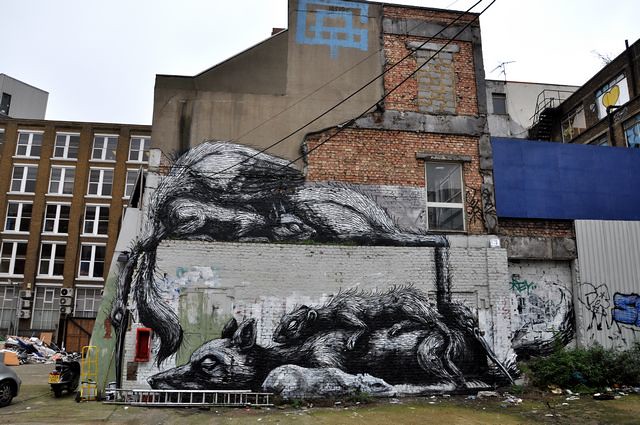
ROA, 2011
Another quirk of the 2010 planning consent was the requirement that the illegal car park that had operated on the land behind the building for nearly 20 years had to close. The silver lining to that was the landlords sought a new use which allowed Red to step in. The only restriction the landlord imposed was “don’t turn it into a car park!” This obliged Red to think less along the rave culture music space and more towards a space where people would eat, and sit down and therefore socialise and communicate.
Red Market led the way in bringing street food into night time venues but they quickly found that just wasn’t making money (for Red Market). So they worked up a location and business model where street food would combine with music, drink and dancing. Ultimately this led to the immensely successful Last Days Of Shoreditch party and event space.
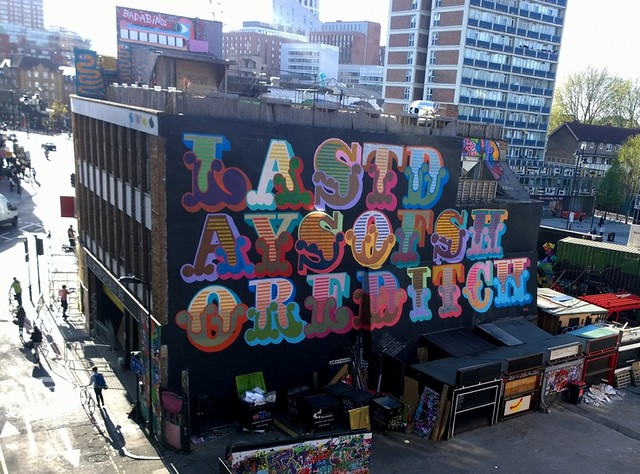
EINE
Connecting with the community remained an important part of the Red Gallery mission and Hackney WickED (promotor of arts and creativity in Hackney, technically a “Community Interest Company”) made use of Red on several occasions. Aida Wilde Hackney Wick based activist artist with a conscience spoke of times she was able to take advantage of the Red facilities.
“I have done two things in Red Gallery, both of them through Hackney Wicked at the invitation of Laura May Lewis, one of the Directors of Hackney Wicked who was quite close to Ernesto” said Aida. “So, the first time Hackney WickED took over the Red Gallery Laura May Lewis curated a group of artists and that was when I did my zebra stencil. That was my first stencil which was really weird, my first and last actually, I swore never to do stencil again!”
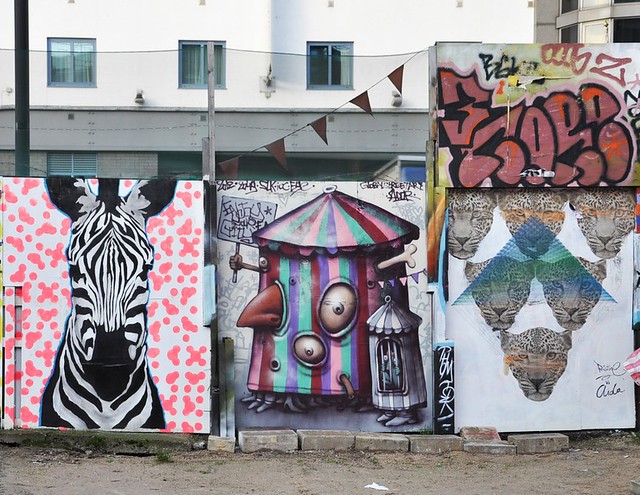
Aida's Zebra; Aida vs Perspicere; Ador sandwiched in middle
Aida’s second venture into the Red Gallery came last year, Ernesto was running a show on the ground floor about resistance and gentrification and had invited Laura May Lewis to bring Hackney WickED in as Hackney Wick was itself being mutilated by rampant gentrification. Laura approached Aida and asked if she would bring her “Print Is Power” collective in as part of the Hackney WickED involvement. Aida recalls “The premise was we could do the workshop, it was open for all, it was free and generously Ernesto covered material costs and stuff like that so we provided all the materials. After the workshop we had a round table discussion about gentrification and the work that Hackney Wicked had done and my contribution to that.”
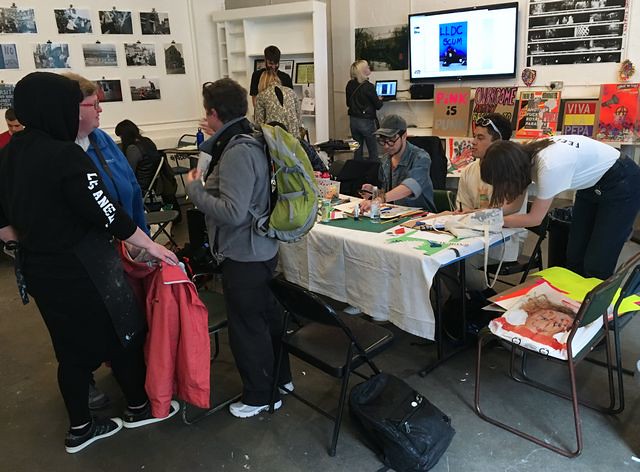
Print Is Power
“Print Is Power is not about entertaining people, there is always a purpose for the project and for what people want to say, that’s the important thing to get across, we were conducting it in an activist capacity rather than a fun afternoon, there was a core meaning to it, otherwise I wouldn’t have done it. “
It was a great workshop actually, a lot of people turned up, and made a lot of beautiful posters and the posters went on display in the show that was currently there for a week.”
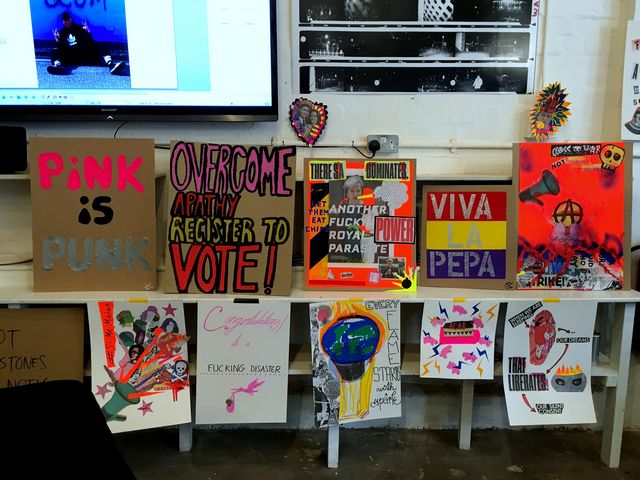
Also co-existing alongside the night street food markets in the open space alongside Red were daytime spraypainting workshops and the landmark magical bus that was parked on the site until a couple of years ago housed a tour group’s offices.
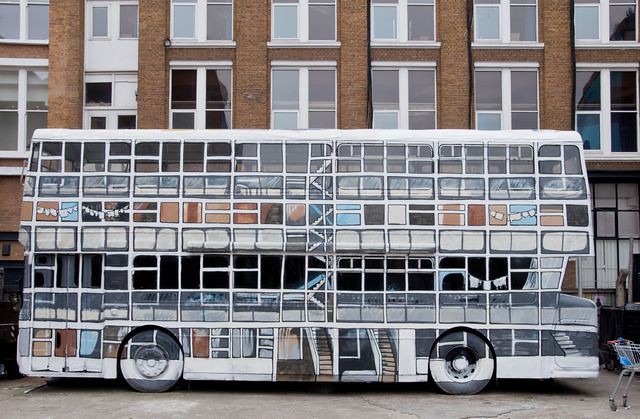
Look closely, you may just spot a bus – artist Jo Peel
A section of the Red Gallery's outside wall has for the past 9 months been given over to political paste ups curated by Flying Leaps and Dr D working in agreement with Red Gallery, the premise was to allow anyone a space to put up their art and if you had art but weren’t the kind of person who went around pasting up on other people’s property or if you simply were overwhelmed with better things to do then you could send your art in and Dr d would do the deed for you.
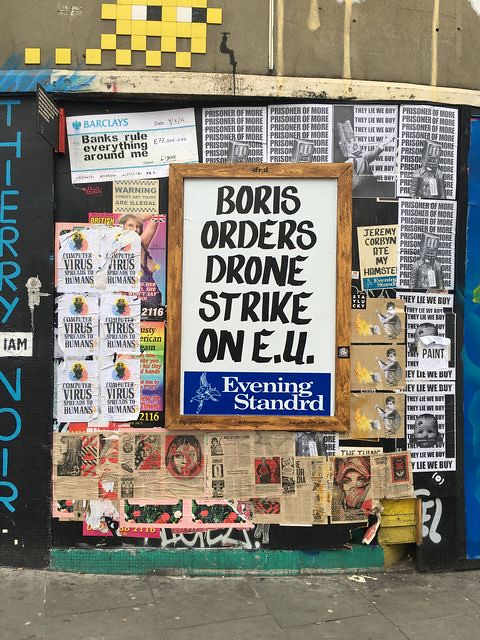
Dr d. Dec 2017 also feat Benjamin Irritant, Space Invader, Don
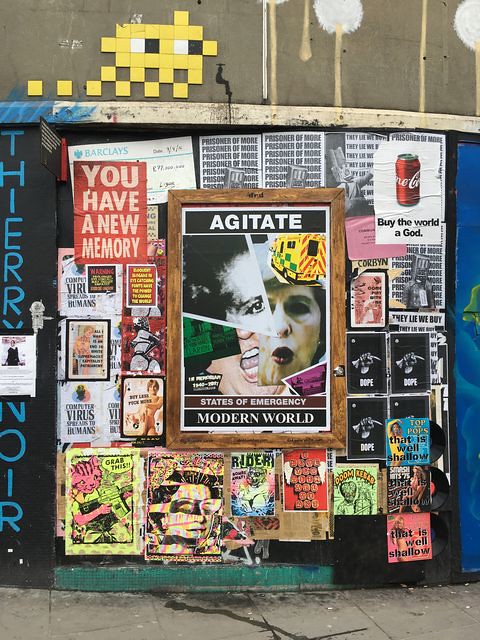
Agitate by Michael Peel, March 2018 Also feat Rider, Bob Osbourne and Carrie Reichardt, Dr d. Kennard Phillipps, Benjamin Irritant, Space Invader, Don
Bang in tune with Red’s mandate to as much possible use out of the building is a surprise find up on the roof – a honey producing beehive! Apparently they forage up to 3 or 4 miles distant from Old Street which means they might come across some resilient and still functioning art communities.
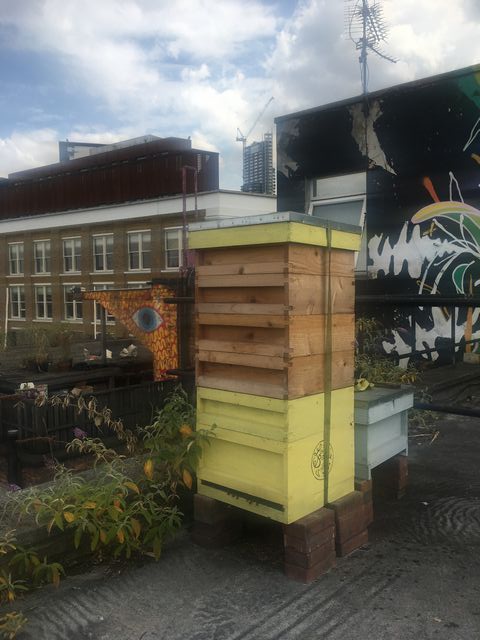
Rooftop Beehive
Red never had any control over the scale of adverts on the North West side of the plot, that was the landlords. They did however control the art on the walls outside and Red has signed off with two spectacular pieces of art. The first is a political piece by Northern Irish artist Anne McCloy commemorates the Irish Civil Rights Movement which sought equality of treatment of all citizens in Northern Ireland, whilst also alluding to appropriation of the red hand, an ancient Gaelic symbol by the loyalist movement. An both respects this can be seen as a "cross-community" non sectarian message.
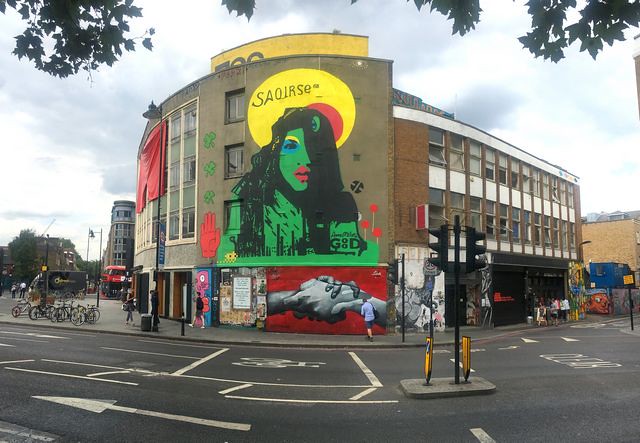
'Saoirse 68' by Anne McCloy (above), Sidok (below)
The second piece was a strange pair or red pants hung from the front of the building, the was a gesture of solidarity with Czech protestors opposing the populist regime installed by President Milos Zeman (think Trump and Farage), the protestors got suspended jail sentences for replacing the Czech flag flying over a castle with a huge pair of red pants, proposing that this could be Zeman’s dirty washing. Finding a supportable political cause whose motif whose colour happens to match your brand has obvious serendipity.
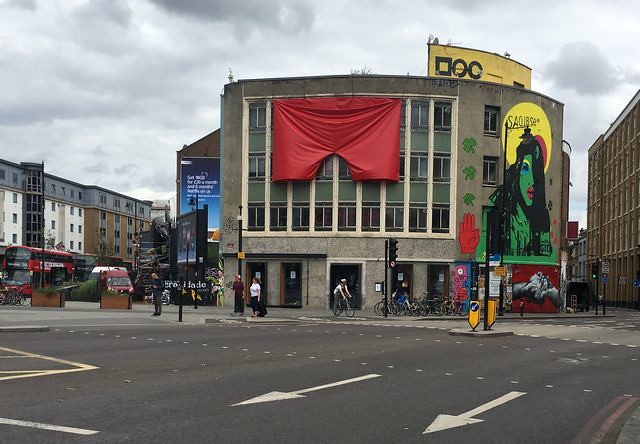
Red Gallery vs Zeman
Sadly last week the inevitable and long anticipated closure of Red Gallery arrived. No squats this time, no noisy protests and furious campaigns against the planning process, just a sigh and a dispersal of talent and the contribution of this corner of Shoreditch to London’s art life will cease. There is an irony in the third character in the trio of Stik figures that overlook the Red Gallery/Last Days of Shoreditch plot, “Shoreditch Future” looks nervous about the future due all the building developments progressing up Paul Street; well the developments have landed right at his feet, that uncertain future is now the doomed present.
It was fitting to see Masker up on the roof last weekfor a final flourish after being up on the Foundry/Red Gallery walls at intervals over many years.
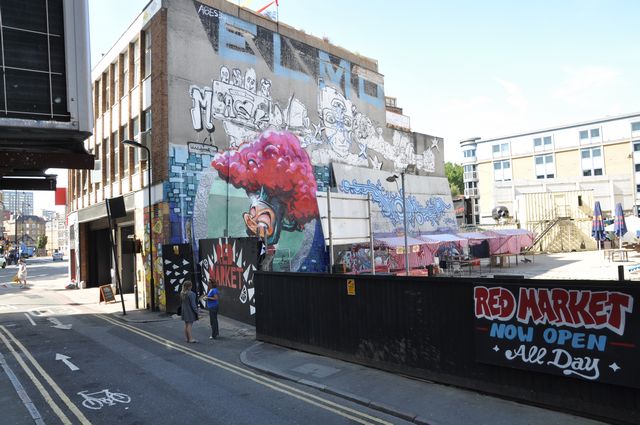
Elmo, Masker, Mr Wany, Zezao, 2012: early days of Red Market street food ops
This week all the adverts came down so Stik’s three figures once again gaze down, their sad and apprehensive expressions can now be seen as mute judgement on the developers.
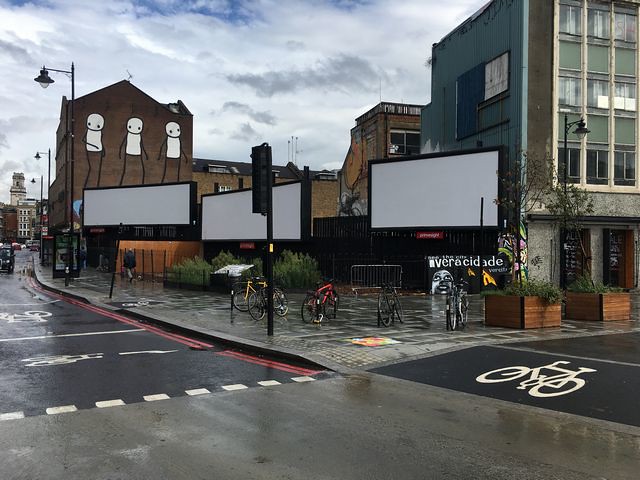
"Shoreditch Past, Present and Future" by Stik
You may try to wipe out the art but you cannot stop the artists. Tracey current lectures in the arts and remains an active artist collaborating on films, photography and events with Bill Drummond, she works with the comedian Mark Thomas and she is also Artist In Residence for the Polar Regions I shit thee not. Ernesto speculates that his future direction may lie in providing more opportunities for experimental and developmental performance art but it won’t be in Shoreditch “This area is gone” he says. If you are curious about the fate of those Banksy stencils in The Foundry’s corridor, all will be revealed in Tracey Moberly’s forthcoming film. BraveCo is heading West to Farringdon. I worry about the bees though, we should always worry about the bees.
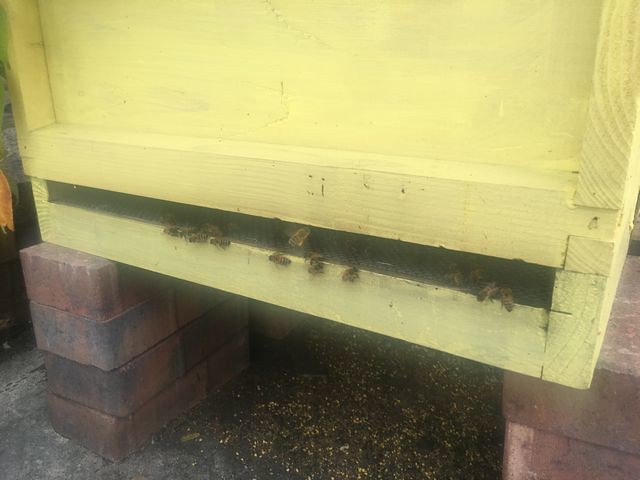
Rooftop Bees
Graffoto would like to thank Ernesto Leal, Tracey Moberly, Stik, Aida Wilde and Florian Stronk for being so generous with their time in sharing their memories with Graffoto and additional thanks to Stik for help with photos as credited above.
All photos Dave Stuart except Stik and Google Street View where credited
Twenty years ago the ground floor and two basement levels were occupied by the arts centre and bar called The Foundry.

FOUNDRY (Google Street View Sep 2009)
The Foundry was launched around 1998 by Jonathan Moberly, Bill Drummond and two other partners and got its name from the fact that there was actually a foundry there in the 90s used in jewellery manufacture. Within a year Jonathan was joined by Tracey Moberly who was planning a comparable venue in Manchester but got sucked into the creative whirlwind gathering strength in Shoreditch. The building was constructed as a branch of Barclays Bank which lead to its quirkiest architectural feature, a vehicle turntable in the middle basement. Vans carrying sacks of cash came down a very steep ramp, loaded and unloaded and then spun on the turntable to face back up the ramp. At many events in that basement the sounds weren’t the only things on turntables.


Copyright up on bank letter box
As well as being a rather grungy though welcoming space for a coffee, a beer and a chat The Foundry hosted many experimental arts events. Whether it was music, performance or paintings or installations, The Foundry housed a curation free, zero pressure arts venue. With 6 spaces available, artists could be offered walls or rooms for them to come in, install their work, invite their friends, have their event, they just had to do all their own hanging, promotion and sales, The Foundry lent literally just its location. Nothing with arts council funding was accepted, everything had to be self funded by the artists. There were no charges for artists to use the space for public display, there were no commissions on any sales, all that was asked of visual artists was that they contributed a piece of art, and it had of course to be something of a standard comparable to the art on display, no simply dashing off a sketch on the back of a sheet of A4. Unless of course that was the mainstay of your art output!

Banksy Happy Chopper
Many artists who got a break in The Foundry went on to become lauded names, including from the street art world Banksy, Faile, Stik and Carrie Reichart. Musicians who cut their teeth with live performances included The Liberteens and Kate Nash, Kate Nash herself has said that she was always going in and performing with Adele at the Foundry.

Hanging about in the Ladies with Carrie Reichardt
Tracey Moberly told Graffoto of the mixing that took place at The Foundry “you’d have a group of ex university lads doing a performance thing upstairs (the ground floor bar) then you’d have a group of punks downstairs doing their performance stuff with all these other exhibitions going on – it was a melting pot of people and ideas. New art going into uncharted territory would come from it”.
The mixture of sub-species who populated, haunted, used and abused The Foundry extended to a considerable collection of super fit crusties plying their trade as cycle couriers, they would rest up with their bikes outside the Foundry and consume vast quantities of coffee from The Foundry’s Gaggia coffee machine. The London Courier Emergency Fund, a charity that raises cash for injured bike couriers used the Foundry as its base.
Tracey hosted a midweek arts radio panel show “The Late Late Breakfast Show” broadcast live from The Foundry, the setting would be a group of people clustered around a table underneath a truly Heath Robinson-esque acoustic reflector/microphone device. I twice had the pleasure of being invited onto the show. This involved sneaking out of my shirt-sleeved suit wearing day job, dressing down and going AWOL for a few hours.

The first occasion was a street art heavy panel including The Krah, Inkfetish and Neonita who I had the pleasure of meeting then for the first time.

ON AIR!

The Late Late Breakfast Show, Resonance FM, Feb 2010
The second occasion was poetry rich and included The Worm Lady and this amazing poetry performance by Grassy Noel (geddit?) backed by freeform jazz saxophonist Mike Walter and Lol Coxall.
Greek street artist The Krah curated two exhibitions in The Foundry’s middle basement and it’s a major plus point that group shows could be artist led; The Krah remains a curator of superb group shows and indeed a very active artist and graffiti writer.

The Krah Group Show feat Pure Evil, Blam, Snub 23, Shannon Crees, 45 RPM, Rugman & others, Aug 2008

The Krah, Foundry, April 2009
Banksy was no stranger to The Foundry, leaving his mark on the famous corridor inside as well as, quite notoriously, on the car park wall outside. Banksy’s Happy Chopper and Grim Reaper stencils inside the lower ground corridor were left to fend for themselves which is the way things should be, if you look closely as well as the more obvious Faile dog and the perhaps less obvious Peripheral Media Projects sticker you can make out the Faile dog “dogged” by a very early Stik figure.

Banksy Grim Reaper

Faile dog & plane, Banksy stencil tag,

Faile feat Stik
Stik kindly sat down with Graffoto and came over all misty eyed with his personal Foundry recollections. “I knew the building very intimately, I know the ghosts of that building, it was very creepy going down there on my own but I felt kind of privileged."
Stik’s second art show was in The Foundry and came about in a rather unusual way as Stik had a novel relationship with The Foundry, he was the cleaner!
“Anyone could do an exhibition there but I was kind of afraid to ask but then Jonathan (Moberly) offered me one” and so in 2008 Stik the building cleaner became Stik the exhibiting artist in the Library, the small room at the front of the bar upstairs. Stik also managed to hijack the stairwell with some large wheatpaste figures. The stairwell was not a space you could ignore in The Foundry, it was where so many people crossed paths on their way to or from or queuing for the toilet. This was a fairly unstable period in Stik’s life “At this point I was sofa surfing, I have photographs of me doing these paintings for The Foundry in my friend’s spare room where I was dossing.“

Stik Exhibition Flyer, Photo by Stik
The Foundry’s “anything goes” spirit is fondly recalled by Stik “They had a policy where you could do whatever you wanted, there was no curation, no invigilation, there was nobody looking after it, you do what you want; they don’t take any money they don’t deal with any shit and they don’t do advertising, nothing, they literally just give you the space. A lot of established galleries do the same but they claim to do a lot more; The Foundry was just really straight about it."

Stik, photo by Stik

Stik Lovers, photo by Stik
Stik spent a period living in a Momart art container and he listened to Resonance 104FM: “It was the first station that had people I knew on it, it was really cool. Resonance was so underground, it was so weird” The thing that blew his mind was the realisation it was broadcasting from the place he knew so well.
“The Foundry was like a safe haven, it was a base of operations , you could try out things there, you could take your felt pens or your paint or stencils and try it all out there in the corridor.” – Stik

Stik, Foundry exterior, 2009
In 2010 serious damage was inflicted on the creative community in Shoreditch when the property owners won permission to raze the whole building and replace it with an 18 storey 350 room hotel. Tracey and Jonathan fought tooth and nail through the council and the courts to get a requirement for community arts facilities to be incorporated as a planning consent requirement. At the time of the application Hackney Council had a Development Management Policy which declared that the Council would “protect arts, culture and entertainment facilities by resisting their loss, unless a replacement facility is reprovided [sic], or it is demonstrated that the facility is no longer required in its current use”. The Council turned one blinkered eye away The Foundry’s long history of providing a nurturing home for the arts community and diverted their other myopic eye away from their own policy and by failing to make suitable provision in the consent sounded the beginning of the end of grass roots arts community within this area.
While running the Foundry, the Moberlys faced a never ending assault from the council’s buff squad (cleaning team) constantly cleaning perfectly legal permissioned art from the front of The Foundry.


Inkfetish, Neonita 2010

"Fuck The Buff" to paraphrase Inkfetish, also feat Neonita detail, 2010
The irony of that became apparent in 2010 when Hackney Council’s planning permission for the demolition of the Foundry building to make way for an hotel incorporated a particularly bizarre condition, a couple of Banksy street art pieces around the back overlooking the car park were to be preserved. Graffoto covered this at length in 2010, describing the relevant Banksy artworks as “pieces of shit” yet the council, who had habitually destroyed brilliant art and graffiti that appeared around the front of the Foundry were now mandating their preservation. Truly the blind are dictating the management of the public visual landscape.

Classic Elmo Rooftop roller, Tango ATG, and some crap by Banksy

Still shit
Having kind of pulled the tail of the developers a little too hard the Moberly’s were obliged to close The Foundry’s doors for the last time in 2010. This prompted community protests and in an eerie foretaste of what was to come a year later, a squat of the building under the banner “Occupy”.


Stik has an interesting confession about the time when the Foundry building was being squatted. “The first generation of squatters were in there and I had just had an exhibition in Mile End Art Pavillion in 2009 and I had made 16 wooden figures in various positions, these 6 foot cut out plywood figures sat in my room in St Mungo’s Hostel. I needed some space so I started to put them up on the street. A lot of them got dismantled or smashed but a few remained, one went up on The Foundry, one went up on the Brady Art Centre, one went on the back wall of Austin Gallery at the top of Brick Lane; a couple have reappeared recently but I know most of them were destroyed."
"I took one of these up to the roof of The Foundry, I needed to attach it to this blue wooden board on the side of the building so I tacked in nails at strategic points on its hands, its feet, on the top of its head and its body and dangled it down over the edge of the building so it sat flush with the blue background, I tied off the cable. I went to the other side of the building and I leaned round and I got a 3 meter extension pole with a hammer gaffa taped to the end of it and I banged the nails in, I had about a 1 in 10 strike rate. Meanwhile, the squatters were trying to keep quiet cos you have to be when you are squatting and there was me banging on the wall to get this artwork in. They were rightly pissed off with me but I had started so I had to finish and it took me about an hour to get all seven nails into the wood. It stayed up there for years. About 4 years ago one of the hands snapped, it looked like someone had tried to rip it off the wall, I went back up there on a ladder with a hammer and I nailed it back in which is why one of the hands is a bit wonky. “

Stik, also feat RUN & ATG, 2012
In fact the figure stayed up there until this month (August 2018), I bumped into Stik with Ernesto a couple of weeks ago supervising the removal of the piece. It will be auctioned and the proceeds donated to charity.

Goodbye Stik Figure

Stored and displayed, Red Gallery garage sale (in Foundry space!) Aug 2018
The Foundry’s DNA proved to be very resilient and in 2012 Red Café and Red Gallery opened with Ernesto Leal and Yarda Krampol at the helm, continuing the culture mission in a similar vein on more or less the same site. “I was doing these pop ups and the landlord came along to me said “This building is going to be empty for 3 months do you want to take it?” Ernesto recalls, “so I said yeah, fine”. The space Ernesto moved into actually is not the same space as The Foundry, the Foundry occupied the front ground floor facing towards Old Street Roundabout and occasionally extended its activities into the Car Park at the rear, including the 2003 and 2004 “Shoreditch Festival” which saw all the streets in the Shoreditch Triangle being closed to traffic for a day and also Banksy creating the huge rat and the TV thrower in the car park. Red Gallery took over a couple of ground floor spaces and then the upstairs floor in the part of the building next to the car park, seemingly there had been some kind of private college on the upstairs floors. Red then took over the Car park and also the basement below the gallery and café, though these were not the bank vaults that The Foundry had used.
Red Gallery encouraged the street art around the building and in collaboration with other agencies was able to bring many top street artists work to the Red spaces including in the early days EINE who did specific RED shutters, Roa, Phlegm and Jo Peel.

RED by Eine, also feat Part2ism

Dr d. 2010
Music was a core feature at Red with many music festivals and experimental sound events taking place in the basement. Ernesto’s old warehouse party organising skills combined with a desire to see interesting fusions within the music scene and experimentation with music combining with poetry and other art forms. “Our motto for this experimentation was “The Only Certainty is The Experience” said Ernesto, a motto conveniently burning in throbbing neon over the downstairs bar.

In 2012 the graffiti world was offering support to the family of graffiti writer King Robbo as he battled to cling on to life, Team Robbo, a graffiti movement inspired by its leader and founder Robbo held an exhibition called “The Origin Of The Species” in the Red Gallery, its novel feature being synchronisation with an exhibition in New York featuring influential old school New York graffiti writers. The exhibition was in part a fundraiser group show took place in the gallery as a fund raiser to support Robbo and his family.

Art by Robbo

Origin Of The Species, Sep 2012

Team Robbo, Red Gallery loos
As the period Red was in the space extended and the owner allowed use more of the spaces, Red started “giving away” spaces to artists and offering work spaces in what became a shared space model now widely recognised under brands such as WeWork. At all times the explicit understanding was that there could be no guarantee of occupancy, the owner could empty the building with next to no notice and that risk had to be acceptable to any parties coming in.
SoundCloud was born in the Red Quarters spaces on the upper floors. Florian Stronk, Co-Founder and CEO of BravoCo told Graffoto that the cheap space with minimal commitment was what allowed them to screw up their first attempt to start a tech business, pick themselves up and succeed with their second and current venture. “It is the saddest day in our Company’s existence the day we have to leave Red” said Florian.
As Ernesto and I chatted, students from RADA were setting up for a one off performance art piece that evening, RED providing the kind of opportunity to stage and perform free from the usual commercial requirements which is of course in the traditions of the location back to The Foundry days. “We never had any misconceptions about what our position was” Ernesto confirms, “we saw it as an opportunity to change perceptions of what art spaces should be about. We opened up the doors to the local community and I think it has worked” by which he refers to club spaces which are dark in the daytime their open door allowed people to come in and see “oh, these spaces are quite nice”
Ernesto has concerns however that there are fundamental shifts taking place in how the new generation of artists connect to their audience and it is making spaces like Red Gallery redundant. “The art gallery as a space to exhibit is becoming obsolete. The present generation come in, get the Instagram thing, make their mark, then leave. They’re not interested in sales cos there is very little money to be made. The kids are on a different level and have taken things in a different way.”

ROA, 2011
Another quirk of the 2010 planning consent was the requirement that the illegal car park that had operated on the land behind the building for nearly 20 years had to close. The silver lining to that was the landlords sought a new use which allowed Red to step in. The only restriction the landlord imposed was “don’t turn it into a car park!” This obliged Red to think less along the rave culture music space and more towards a space where people would eat, and sit down and therefore socialise and communicate.
Red Market led the way in bringing street food into night time venues but they quickly found that just wasn’t making money (for Red Market). So they worked up a location and business model where street food would combine with music, drink and dancing. Ultimately this led to the immensely successful Last Days Of Shoreditch party and event space.

EINE
Connecting with the community remained an important part of the Red Gallery mission and Hackney WickED (promotor of arts and creativity in Hackney, technically a “Community Interest Company”) made use of Red on several occasions. Aida Wilde Hackney Wick based activist artist with a conscience spoke of times she was able to take advantage of the Red facilities.
“I have done two things in Red Gallery, both of them through Hackney Wicked at the invitation of Laura May Lewis, one of the Directors of Hackney Wicked who was quite close to Ernesto” said Aida. “So, the first time Hackney WickED took over the Red Gallery Laura May Lewis curated a group of artists and that was when I did my zebra stencil. That was my first stencil which was really weird, my first and last actually, I swore never to do stencil again!”

Aida's Zebra; Aida vs Perspicere; Ador sandwiched in middle
Aida’s second venture into the Red Gallery came last year, Ernesto was running a show on the ground floor about resistance and gentrification and had invited Laura May Lewis to bring Hackney WickED in as Hackney Wick was itself being mutilated by rampant gentrification. Laura approached Aida and asked if she would bring her “Print Is Power” collective in as part of the Hackney WickED involvement. Aida recalls “The premise was we could do the workshop, it was open for all, it was free and generously Ernesto covered material costs and stuff like that so we provided all the materials. After the workshop we had a round table discussion about gentrification and the work that Hackney Wicked had done and my contribution to that.”

Print Is Power
“Print Is Power is not about entertaining people, there is always a purpose for the project and for what people want to say, that’s the important thing to get across, we were conducting it in an activist capacity rather than a fun afternoon, there was a core meaning to it, otherwise I wouldn’t have done it. “
It was a great workshop actually, a lot of people turned up, and made a lot of beautiful posters and the posters went on display in the show that was currently there for a week.”

Also co-existing alongside the night street food markets in the open space alongside Red were daytime spraypainting workshops and the landmark magical bus that was parked on the site until a couple of years ago housed a tour group’s offices.

Look closely, you may just spot a bus – artist Jo Peel
A section of the Red Gallery's outside wall has for the past 9 months been given over to political paste ups curated by Flying Leaps and Dr D working in agreement with Red Gallery, the premise was to allow anyone a space to put up their art and if you had art but weren’t the kind of person who went around pasting up on other people’s property or if you simply were overwhelmed with better things to do then you could send your art in and Dr d would do the deed for you.

Dr d. Dec 2017 also feat Benjamin Irritant, Space Invader, Don

Agitate by Michael Peel, March 2018 Also feat Rider, Bob Osbourne and Carrie Reichardt, Dr d. Kennard Phillipps, Benjamin Irritant, Space Invader, Don
Bang in tune with Red’s mandate to as much possible use out of the building is a surprise find up on the roof – a honey producing beehive! Apparently they forage up to 3 or 4 miles distant from Old Street which means they might come across some resilient and still functioning art communities.

Rooftop Beehive
Red never had any control over the scale of adverts on the North West side of the plot, that was the landlords. They did however control the art on the walls outside and Red has signed off with two spectacular pieces of art. The first is a political piece by Northern Irish artist Anne McCloy commemorates the Irish Civil Rights Movement which sought equality of treatment of all citizens in Northern Ireland, whilst also alluding to appropriation of the red hand, an ancient Gaelic symbol by the loyalist movement. An both respects this can be seen as a "cross-community" non sectarian message.

'Saoirse 68' by Anne McCloy (above), Sidok (below)
The second piece was a strange pair or red pants hung from the front of the building, the was a gesture of solidarity with Czech protestors opposing the populist regime installed by President Milos Zeman (think Trump and Farage), the protestors got suspended jail sentences for replacing the Czech flag flying over a castle with a huge pair of red pants, proposing that this could be Zeman’s dirty washing. Finding a supportable political cause whose motif whose colour happens to match your brand has obvious serendipity.

Red Gallery vs Zeman
Sadly last week the inevitable and long anticipated closure of Red Gallery arrived. No squats this time, no noisy protests and furious campaigns against the planning process, just a sigh and a dispersal of talent and the contribution of this corner of Shoreditch to London’s art life will cease. There is an irony in the third character in the trio of Stik figures that overlook the Red Gallery/Last Days of Shoreditch plot, “Shoreditch Future” looks nervous about the future due all the building developments progressing up Paul Street; well the developments have landed right at his feet, that uncertain future is now the doomed present.
It was fitting to see Masker up on the roof last weekfor a final flourish after being up on the Foundry/Red Gallery walls at intervals over many years.

Elmo, Masker, Mr Wany, Zezao, 2012: early days of Red Market street food ops
This week all the adverts came down so Stik’s three figures once again gaze down, their sad and apprehensive expressions can now be seen as mute judgement on the developers.

"Shoreditch Past, Present and Future" by Stik
You may try to wipe out the art but you cannot stop the artists. Tracey current lectures in the arts and remains an active artist collaborating on films, photography and events with Bill Drummond, she works with the comedian Mark Thomas and she is also Artist In Residence for the Polar Regions I shit thee not. Ernesto speculates that his future direction may lie in providing more opportunities for experimental and developmental performance art but it won’t be in Shoreditch “This area is gone” he says. If you are curious about the fate of those Banksy stencils in The Foundry’s corridor, all will be revealed in Tracey Moberly’s forthcoming film. BraveCo is heading West to Farringdon. I worry about the bees though, we should always worry about the bees.

Rooftop Bees
Graffoto would like to thank Ernesto Leal, Tracey Moberly, Stik, Aida Wilde and Florian Stronk for being so generous with their time in sharing their memories with Graffoto and additional thanks to Stik for help with photos as credited above.
All photos Dave Stuart except Stik and Google Street View where credited

I remember ROA and Remed up on the roof !
ReplyDeleteYour collective documentary and thoughts immersed with deep hearted interviews sheds much light on this arty historic venue. We are witness to saying goodbyes to yet another page from the underground roots of London street art.. Without the wisdom of the camera and the diligence of recording vibes in words and snaps of what you have seen Dave, this chapter may well have passed untold. Thank you so much for posting this....
ReplyDelete12 August 2018 at 11:28
I played a live set there once with Melvin Pickles, it was a great venue!
ReplyDelete